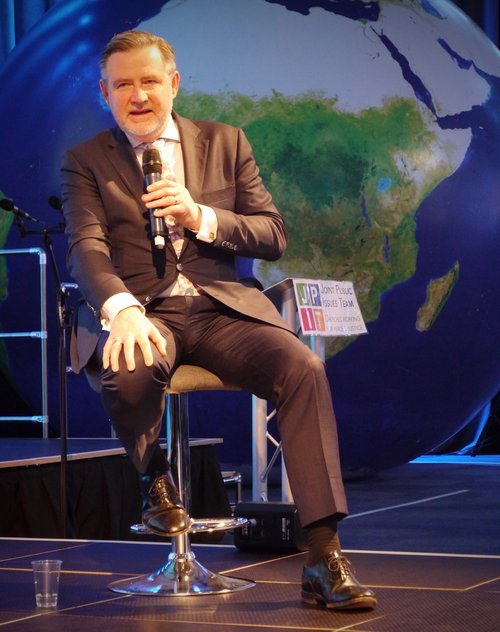JPIT Conference calls on churches to challenge political and economic leaders ahead of COP26
10 March 2020
10 March 2020
In a pivotal year for climate justice, churches have been urged to challenge economic and political assumptions and to become agents for change in addressing the climate emergency.
Delegates at a conference organised by four Christian denominations heard that redesigning the economy to work for the well-being of people and planet is vital if climate change is to be taken seriously. At this crucial time, churches are urged to call politicians to account through face-to-face dialogue and join with others to be the engines driving change.
The Joint Public Issues Team welcomed over 300 delegates to its national conference in Derby on Saturday 7th March. The theme of ‘Renewal and Rebellion: Faith, Economy and Climate’ brought together leading politicians and economists, theologians and practitioners to start conversations and inspire people of faith into action.
The Joint Public Issues Team (JPIT) is the group which draws the Methodist Church, United Reformed Church (URC), Church of Scotland and Baptist Union together to work on issues of peace and justice.
Keynote speakers at the conference included the Shadow Secretary of State for International Development and Shadow Minister for Climate Change, Barry Gardiner MP, Katherine Trebeck of the Wellbeing Economy Alliance, Professor Anthony Reddie, Director of the Oxford Centre for Religion and Culture, Christine Allen, Director of CAFOD, and Ross Greer MSP.

A panel of young climate activists included Isaac Harvey, a filmmaker who created a film urging the URC to divest from fossil fuels – a policy which was approved nationally in 2019; Ali Greaves, a paediatric nurse who represented the UK at the UN Winter Youth Conference and the Eurocities 2018 Conference; and Aaron Smith, a campaigner with the UK Student Climate Network.
Speaking of the political situation in the UK, Barry Gardiner MP said: “The listening is being done to too few people: it isn’t to the poor or the marginalised; it is to the corporate powers.”
He said that there is, “deep pain in our society and we need to be listening to those people. That is what made me a Christian, it is what inspired me. It is to understand that God is on the side of the poor and the marginalised.”
On caring for the environment, Anthony Reddie said “It is to our eternal shame that the Church has not been at the forefront of this.” He said, care for the environment is at the core of the Gospel: “we have sadly been too much embedded within empire, and therefore we have helped to exploit the very thing that God has given us.”
Katherine Trebeck, a political economist, said: “The sooner we start aligning our economic policy regime with building the conditions of well-being - relationships, healthy natural environment, fairness, dignity - then we will start to transform the economy.”
Younger panellists spoke about the need for intergenerational justice. Aaron Smith from the UK Student Climate Network, said: “How can you as older generations tell me that my future is not as important as short term financial interests?”
The conference included poetry written for the event from the JPIT poet in residence, the Revd Lucy Berry, glass installations by glass artist the Revd Michaela Youngson and visual minutes by Sara Parratt-Halbert.

Michaela Youngson, said: “We need to find every means we can to communicate the message that human beings are damaging the planet, our home. Art is one of the ways we can get the message across, before it is too late. Glass and wood are renewable resources and, like God’s creation, can be incredibly strong or fragile and vulnerable.
“These two art pieces, ‘Acts of Uncreation’ and ‘The Leaves of the Trees are for the Healing of the Nations’ represent the twin themes of the JPIT Conference, ‘Rebellion and Renewal’. It was a joy to work on them during my sabbatical.”
Rachel Lampard, JPIT Team Leader, said: “The conference was about finding creative ways to respond to our calling to be disciples of Christ, by speaking truth to power and exploring how our own power might be used for the common good.
“I felt that there was a real energy created and look forward to supporting churches as they respond in this pivotal year.”
The conference was live streamed on Facebook and is available to watch again here: https://www.facebook.com/pg/jointpublicissues/videos/